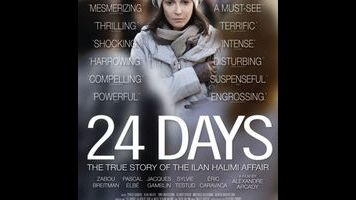In the Taken films, Liam Neeson works alone, and gets shit done: The series is a gung-ho fantasy of a vigilante outpacing the authorities in the search for wrongfully imprisoned innocents. By contrast, the French docudrama 24 Days, about a young man who is taken and held for ransom, takes place in the real world; scrupulously based on a real-life kidnapping, it plays out in a considerably less triumphal vein. The film is adapted from a memoir by Ruth Halimi, whose 23-year old son Ilan was snatched and sequestered in Paris in 2006 by an international group calling itself the “Gang Of Barbarians.” The implication of her book is that Ilan was targeted for being Jewish, and that the local police’s arguable mishandling of the case and its aftermath were similarly connected to—if not necessarily representative of—anti-Semitic attitudes in a country with a deeply entrenched history of racism and xenophobia.
This is delicate subject matter, but director Alexandre Arcady (the father of grind-house auteur Alexandre Aja) keeps applying sledgehammer force to scenes that would surely hit home without it. He means to plunge the viewer deep inside the fear and rage of the Halimi family, whose members are excellently played by an ensemble cast that includes Zabou Breitman (as Ruth Halimi) and Pascal Elbé as Ilan’s father Didier, depicted here as a man caught between his anger at the kidnappers and the instructions of the police negotiators to play it cool and aloof. The film is all forward momentum, chronicling the efforts of a special task force to track Ilan’s captors while occasionally cutting to the hostage himself, in scenes that have been calibrated for maximum unpleasantness. (One could make the case that sanitizing these passages would have been even more problematic, albeit in a different way.) The accelerated pace and intensity make for compelling viewing even as they rush the film past the big picture that it’s supposedly trying to take in. 24 Days never explicitly addresses the ethnic diversity of the perpetrators, whose insistence on outlandish sums of money in exchange for Ilan’s life seems rooted as much in their shared suburban poverty as ideologically motivated cruelty.
Beyond the basic emotional intensity of its scenario, which hews closely to the historical record, the film resonates most as a study of surveillance culture. Scenes of the cops trying to remotely track the criminals via their burner phones and pop-up email accounts paint an ambivalent picture of a plugged-in internet culture that affords unprecedented opportunities for authorities and lawbreakers alike. These sorts of internet forensics are familiar from primetime television, but they feel uncommonly authentic here. 24 Days is neither subtle nor particularly sophisticated as filmmaking, but its refusal to reduce lived reality to generic tropes is admirable.

